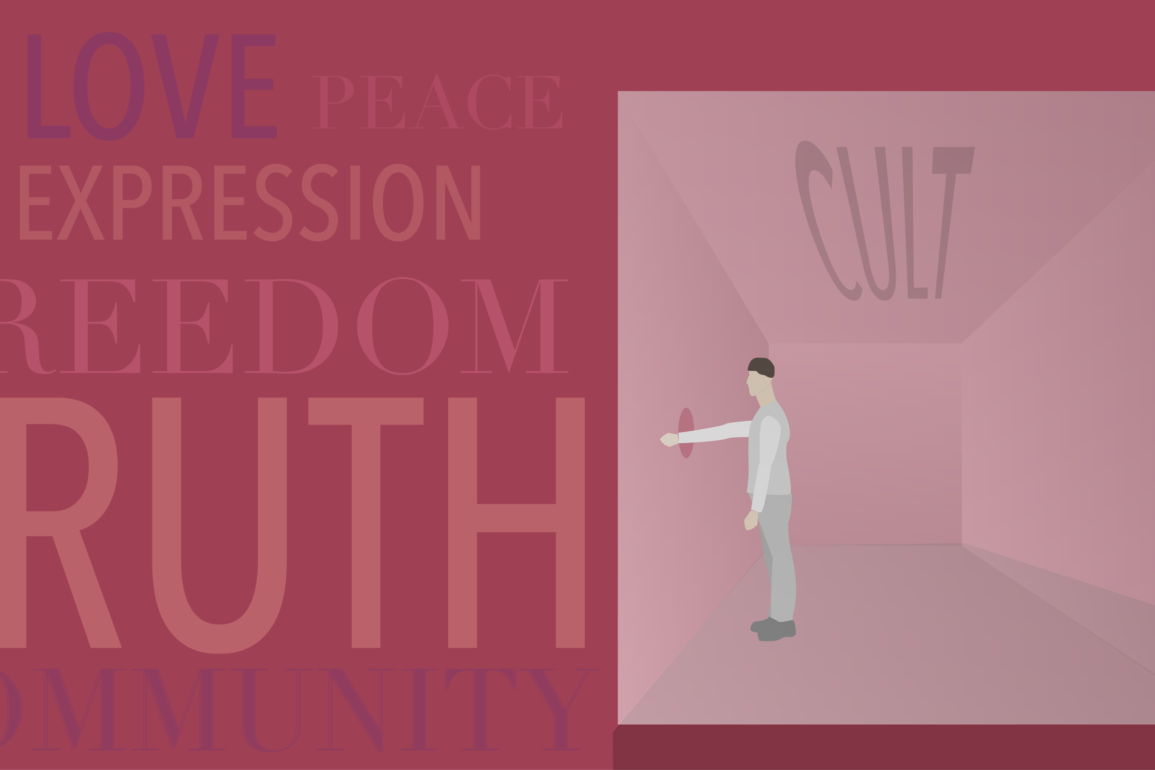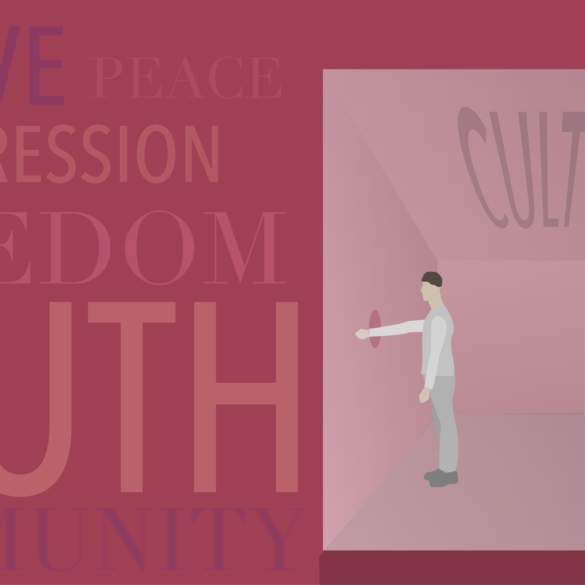With more people choosing to identify with no religion, one student speaks about what led him away from his religious community.
Jonah James used to worry constantly about going to hell, even though he was part of what he considered to be the only true religion: Christianity. That’s what he had always been taught.
Jonah had been taught many things, in fact. According to his church community, women should dress modestly and keep their hair long, men should provide for their families, and anyone outside his church was going to hell. Since leaving, he has had to rethink everything he once knew.
Jonah is one of the 23 percent of Americans who claim no religion, according to Pew Research Center. This ever-growing group of religious “nones” are those who select “none” on questions about religious preference. According to a 2014 study by Pew Research, 18 percent of nones grew up in Christian religions. Just 7 percent of nones are atheists and agnostics, while 37 percent still believe in heaven, and 27 percent believe in hell.
Jonah says he has no religion but still can’t identify with atheism or agnosticism because of his experiences and the community he grew up in.
That community was “The Church without a Name,” as it is often called among those not affiliated with it. The religion has spread throughout the United States, as well as other parts of the world, such as Australia and Ireland. The secretive religion has no designated buildings or pastors. Instead, “meetings” are held in houses. “Workers,” which are similar to pastors, speak at these meetings.
There are two workers for every region, usually spanning a few towns. They have few material possessions and rely on church members for most things, including temporary housing.
The religion doesn’t have a website. Only one hymn book is associated with the faith.
Jonah’s family had been a part of this religion for generations. He was born into it, and the church was all he knew. Because the community was very close (even if, as Jonah believes, that closeness was forced), he didn’t have much of a choice in who he would spend time with.
William Shaffir, a sociology professor from McMaster University, says religion can define who someone is. Leaving a faith community can be extremely hard because so much of one’s identity is associated with it. Shaffir sometimes sees people struggle to socialize with others outside their communities because of the strict behavioral roles set by their past religions.
Religion can also drive important life choices, says Matthew Hotham, an assistant professor of religious studies at Ball State University.
Jonah’s religion has interfered with his secular communities. When he was roughly 5 years old, his family moved to a new state. He became best friends with the neighbor girl and remembers asking his family whether or not she was going to heaven. The girl was Mormon, another religion with Christian roots. His father said that no, the girl would not be saved. According to their church, even people in other Christian denominations can’t be saved unless they convert.
In fifth grade, Jonah became friends with a boy who had come out as gay. Jonah told his friend that being gay would send him to hell. He regrets that to this day. The boy ended the friendship out of anger. From there on out, Jonah decided to play it safe and only have friends who were Christians.
But that wasn’t much easier. Jonah believes the secretive nature of the church and the boundaries it created between him and the outside world made him very introverted. He was socially anxious and had trouble connecting with people who didn’t share his beliefs.
In certain contexts, Hotham says, religious boundaries can be helpful in ensuring religions have separate spaces to worship and carry out practices and traditions.
Shaffir agrees, saying boundaries are necessary for some religions to operate. But these same boundaries can cause problems for individuals, especially those who decide to leave.
When Jonah was a pre-teen, his older brother began voicing doubts about the church to his family. The teen and his parents fought night after night about the church and its beliefs.
At first, Jonah sided with his parents—his brother was just confused. But after a while, Jonah realized things weren’t so black and white.
He didn’t know who to believe. He started pretending to be sick so he wouldn’t have to go to Sunday meetings.
A 2016 study by Jordan M. Sannito for the University of Notre Dame examined the effects role strain had on people in religious communities. Role strain occurs when two aspects of an individual’s life, such as family and religion, overlap. When conflicts arise, like people doubting their faith, two aspects of life are affected by one problem. Now, a choice must be made.
Jonah’s parents began to attend Bible studies outside the church with no name. Jonah didn’t see how this could be a bad thing, but the workers did. In a private meeting, Jonah’s parents were given a choice: They could either keep going to these unapproved Bible studies, or they could continue to host Wednesday meetings for the church.
His parents chose the Bible studies. Jonah thinks that’s one of the things that led to them leaving.
Rumors about Jonah’s family started to spread, and they stopped getting invited to community events. People ignored his family’s invitations to similar events. The people Jonah’s family once identified so strongly with now wanted nothing to do with them.
So they left.
They didn’t have much choice. They left, and they had to start over. Jonah’s father looked for another religion, but his mother wasn’t ready. And just like that, the fighting about religion started all over again, only this time, between Jonah’s parents.
It was especially hard for his mother. Her entire life was connected to this community in which women ran the household, and men provided them with money to do so. Now, she was thrust into a different world and didn’t know how to respond.
A 2016 study by Andrew Fenelon and Sabrina Danielson found that people who disaffiliated from religion experienced lower levels of well-being. However, those who were not religious but continued to go to church didn’t experience any decline in wellness. This might be because still having community could be the thing that maintains an individual’s happiness.
It’s been about five years since Jonah left the church with no name. After leaving, he realized he was transgender and began the process of coming out to his family. When he was in the church, it had never occurred to him he might be trans because this question couldn’t even be asked in his religion.
Jonah is still dealing with the effects leaving the church took on his mental health. Sometimes he will have multiple weeks or a month when he obsesses over religion. It’s especially hard for him to see hate preachers on Ball State’s campus, and even harder for him to see people interact with them. He knows getting angry with people like that will only make them feel more passionate about their religion. He experienced similar emotions when he was in his church.
Most of the time, Jonah doesn’t believe heaven and hell exist, but he still can’t rule them out.
Jonah is sometimes haunted by the fear that he’s wrong about everything. The church might have been right, and he should have never questioned it. And now, he’s condemned himself to hell.
He also worries about the people he had to leave behind. Because the religion values secrecy, there are strict rules about technology use for its members. Jonah can’t even check social media for updates on the people he used to know. He especially worries about children and young people in the church who might be unhappy but are forced to remain in the religion.
Since leaving, Jonah has built up a group of friends and feels accepted.
He has tried to live his life as opposite from the church as he can. He doesn’t think anything the church taught him is something he wants to continue to practice. The love and understanding the church preached wasn’t the kind of love and understanding Jonah believes in now. That was just judgment and hate disguised as love, he believes. He can’t imagine living his life with that kind of love ever again.
Jonah doesn’t know if he’s happier now than he was before. Leaving the church didn’t magically cure him of his problems. But it did make him more aware of the world around him. Leaving allowed him to accept himself and learn to accept and connect with others. He knows this isn’t happiness, but it’s a step in the right direction.




